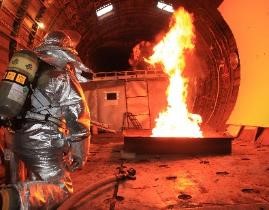Global Leaders in Aircraft Fire Fighting Research

Aircraft fires are especially challenging and dangerous for several reasons. They often occur in tough-to-access areas such as aircraft engines and cargo holds, and they typically involve spilled jet fuel and a variety of other material hazards.
The FAA prepares our nation’s airports for aircraft fires under ATR’s Aircraft Rescue and Fire Fighting (ARFF) Program. This program promotes a safer national aerospace system by vetting the tools, techniques, and training to save passenger and crew lives and protect rescuers.
Thanks to an evolving, world-class ARFF Research Facility and a fleet of versatile test vehicles, ATR has the leading edge in discovering and testing new firefighting methodologies. At the ARFF Research Facility in Atlantic City, NJ, FAA researchers create interior, exterior, and cargo fires, analyzing and extinguishing them using a variety of specialized vehicles and test equipment. The heart of the ARFF Research Facility is a custom-built ARFF Test Laboratory that allows FAA researchers to evaluate firefighting techniques and products in a controlled, repeatable, and environmentally friendly way.
|
|
The ARFF Research Facility includes an L1011 wide-body aircraft. The aircraft has multiple fire-hardened test chambers used to simulate onboard firefighting scenarios. The fire-hardened test chambers allow researchers to assess safety considerations and test and evaluate firefighting tactics and strategies in an actual aircraft environment.
Research has been conducted using a high-reach extendable turret (HRET) with Aircraft Skin Penetrating Nozzle (ASPN) to pierce the fuselage of a plane for fire extinguishment. Both test chambers in the aircraft feature at least 1 ASPN used to discharge agent into the chamber. The test aircraft also facilitates the assessment of victim survivability during post-crash firefighting tasks.
|
 The ARFF Program conducts fire tests and studies to:
The ARFF Program conducts fire tests and studies to:
- Gather data on equipment and fire agent performance
- Investigate and inform the ways today’s aircraft characteristics (e.g., passenger loads, fuel stores, composite materials, unique space configurations) affect incident preparedness
- Assess ARFF tools and tactics for industry best practice
- Develop guidance that reduces the risk associated with fire rescue events
Fire studies conducted at the ARFF Research Facility complement in-flight survival research performed nearby at the FAA’s Fire Safety Branch. FAA also partners with the U.S. Air Force to conduct large-scale fire tests at Tyndall Air Force Base near Panama City, Fla.
Learn More
ARFF Vehicle Research
Cargo Fires Research
Composite Fires Research
Fire-Extinguishing Agent Research
New Large Aircraft Research
Additional Reports